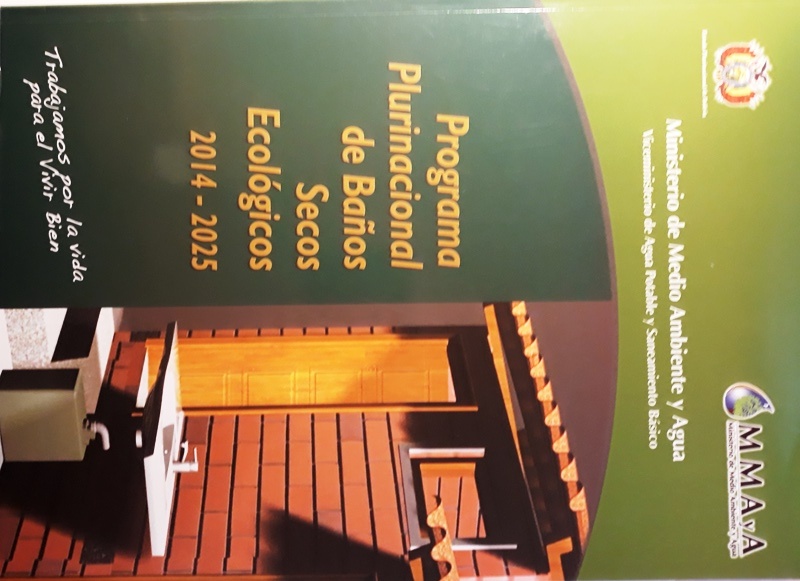- Forum
- categories
- Sanitation systems
- Toilets without urine diversion
- Composting toilets, Arborloos
- Composting toilets do not produce compost - true or false? And is "composting toilet" a misnomer?
Composting toilets do not produce compost - true or false? And is "composting toilet" a misnomer?
146k views
Re: [SuSanA Forum] Composting toilets do not produce compost - true or false? And is "composting toilet" a misnomer? (Composting toilets, Arborloos)
But in the end it is resulting pathogen levels that matter, the outcome not the process. The one tried and true method for destroying pathogens involves the variable time. High temperature is not required to destroy pathogens, provided you're willing to wait. The difference is that time is 100% reliable. The other variables don't really matter when time is involved.
In order to make compost there needs to be a thermophilic stage.
Not true.
Compost is better defined as the product, i.e. "safe, stable, mature" rather than any specific biological process to achieve that. If I make a toilet that does not involve a thermophilic stage, but I design it so the decomposed waste rests for 2+ years before being handled, why shouldn't I call it a composting toilet?
I would suggest that Elisabeth updates her definition to:
A composting toilet is a type of toilet that treats human excreta by a biological process called composting. This process leads to the decomposition of organic matter and turns human excreta into humus-like material, but may not destroy all pathogens. A pathogen-removing composting toilet includes processes that destroy all pathogens.
If there isn't decomposition then it isn't a composting toilet. Dehydrating human excreta doesn't involve decomposition and the result isn't a humus-like end product.
Vermifilter.com
www.vermifilter.com
Please Log in to join the conversation.
You need to login to replyRe: [SuSanA Forum] Composting toilets do not produce compost - true or false? And is "composting toilet" a misnomer? (Composting toilets, Arborloos)
Founding Member of Water-Wise Vermont (formerly Vermonters Against Toxic Sludge)
Please Log in to join the conversation.
You need to login to replyRe: [SuSanA Forum] Composting toilets do not produce compost - true or false? And is "composting toilet" a misnomer? (Composting toilets, Arborloos)
This is composting in a batch process using human waste as a feedstock. This type of batch process and attention to mix can reliably achieve thermophilic temperatures.
Bucket collection of human waste is not a composting toilet.
Batch Composting is being done (process) to human waste collected dry (no flush water) and transferred elsewhere for separate processing. This is not a composting toilet. In other words the batch composting of toilet waste is not a composting toilet. I blame long term poor use of this term on the misunderstandings that abound.
Geoff Hill
Toilet Tech
Please Log in to join the conversation.
You need to login to reply- joeturner
-
 Less
Less- Posts: 717
- Karma: 23
- Likes received: 185
Re: Which composting toilet to choose - recommendations, please?
Personally the only system I'd have confidence was actually composting would be a regularly turned windrow - and even there I believe there is evidence that areas which have not reached temperature can re-inoculate areas which have.
The reason is that I believe you need the volume and correct C:N ratio to reliably get to high temperatures needed to kill pathogens - plus sufficient oxygen to allow aerobic microbial respiration. I think there is good evidence to show this in the academic literature and only anecdotal evidence supporting the idea that small, enclosed,composting toilets actually do any kind of treatment n a reproducible and reliable way.
But changing anything seems like a monumental task given how many are distributing these kinds of system.
Please Log in to join the conversation.
You need to login to replyRe: Which composting toilet to choose - recommendations, please?
1) what is the objective of this forum? Provide a place to share popular information (with limited peer-review) or deliver a public service towards increasing human health and protection of the environment (higher and more important level of peer-review)? If former, fine, call composting toilets composting toilet because of the history, familiarity, and warm fuzzy feelings this gives people when they sh!t and toss in sawdust. If the latter, then consider that there are no well documented cases where composting conditions (definition = thermophilic) occur in a vessel under a toilet seat, and thus the only reasonable thing to do is eliminate "composting" from "toilet", for the sake of human health. The definition of composting is already well set in the science and engineering literature and necessitates a thermophilic step. Continuous compost reactors (usually drums or tunnels) used in the industrial world run consistently at or above 55C. Compost toilet chambers run at ambient temperatures >99% of the time. Thus they are not composting and they do not produce compost. The reasons for this are many and described earlier and cannot be overcome except in highly managed situations such as lab experiments.
If we do our best to eliminate the term composting toilet I think this could be a structure that works:
Flush Toilet
- water to sewer or septic tank/field
- tiger toilet (pour flush)
-could be urine diverting or not, with flush water in either side
Dry Toilet (no water)
-urine diverting OR mixed waste
-toilets with or without additives (some need no additives like Ecodomeo urine diversion conveyors, some have ash / lime for pathogen destruction, some use sawdust to absorb urine if mixed waste)
There are a myriad of process than can be done to the waste from these two broad groupings, and there could be 5-10 toilet systems under each sub heading of Dry Toilet, but these can be sorted and grouped in sub categories underneath the major headings (Dry toilet - urine diverting OR Dry Toilet - mixed waste), as these types and technologies will come and go.
Please Log in to join the conversation.
You need to login to reply- joeturner
-
 Less
Less- Posts: 717
- Karma: 23
- Likes received: 185
Re: Which composting toilet to choose - recommendations, please?
I would like to dovetail on Dr. Hill’s comment in a previous post, "What is missing in these forums are the voices of people & agencies actually operating these units.”
First. Yes, composting toilet is a misnomer, as per points thoroughly enumerated by Dr. Hill.
Second. I would like to be one of the voices that can testify about is an eco sanitary, thermophilic compost toilet system operating in Portland, OR, USA. A paper I co-authored titled, "The Kailash Ecovillage project converting human excreta into organic foodstuffs and sanitized compost using new international building codes for compost toilet and urine diversion systems” was submitted for final editorial review just yesterday for publication in the forthcoming, first edition of IWA’s Blue-Green Systems, Ref: BGS-EM192R1.
This experimental composting toilet system modeled after the Water Efficiency and Sanitation Standard (WE-Stand) set forth by the International Association of Plumbing and Mechanical Officials (IAPMO); it has been operating since March 2014. We call the humanure excreta collection device the commode AKA Joe Jenkins’ Lovable Loo. Urine and human excreta are hot composted (thermophilic temperatures) in a dry-composting toilet processor system for eventual use on the community’s organic gardens. The system consists of urine collection vessels, multiple portable collection containers/commodes for excreta, toilet paper, cover material, and a compost processor. Logs returned sustained thermophilic compost temperatures. Compost and urine pathogen testing met American National Standards Institute (ANSI) and National Sanitation Foundation Standard 41 (NSF 41) requirements.
Unfortunately this is part of the problem - there is no real reason why Jenkin's humanure system should ever meet western standards. It's a basic system where limitations of added carbon and oxygen should limit the amounts of composting and pathogen kill.
And yet somehow it is still reported regularly that the system works.
So the question is why it works.
My view is that it is a combination of things - but most likely that the materials used did not have high levels of pathogens in the first place (and they were not spiked during experimentation), that the standards do not consider highly resistant pathogens that are not common in North America and that the reductions in pathogen counts (I can't remember the detail but I think the requirement is a certain log reduction) are fine if there aren't many pathogens there in the first place but nothing more than you'd get from normal die off in an enclosed container in six months.
In anything other than essentially optimal conditions, I can't see any reason for believing that it something that should be replicated, encouraged or even attempted.
Please Log in to join the conversation.
You need to login to reply- rsilveti
-
 Less
Less- Posts: 18
- Karma: 1
- Likes received: 8
Re: Composting toilets do not produce compost - true or false? And is "composting toilet" a misnomer?
Hola Elizabeth
En realidad en Bolivia se usan varios nombres para referirse al los baños con separación de orina como: Baños ecologicos, baños secos, el Ministerio del Agua de Bolivia tiene una estrategia que se llama "Programa Plurinacional de Baños Secos Ecológicos 2014 -2025" si estoy de acurdo con todos los que opinan que no debería usarse el nombre de Baños composteros, por que en el mismo, no se concluye el proceso de compostaje, estos residuos deben ser tratados en forma secundaria en instalaciones especialmente diseñadas para la producción de composta o Humus si se tratan con lombrices. es por esta razón que nosotros hablamos de saneamiento ecológico descentralizado que incluye toda la cadena de valor, desde el baño con separación hasta el reuso del abono seguro en agricultura.
En relación a LaDePa., nosotros tenemos una maquina desarrollada en Bolivia, que produce pelets, evidentemente en base a la tecnología de Durban, utilizamos gas para producir una temperatura de 340 a 450 °C, que garantiza la pasteurizacion de los abonos orgánicos, especialmente en la eliminación de todos los patógenos y de los huevos y quistes de Ascaris te adjunto un link
photos.app.goo.gl/bitxHMBYms91zU3n7
photos.app.goo.gl/JDMGq3UBuhfVnnKR8
++++++++++
Translation provided by Google Translate:
Hello, Elizabeth Actually in Bolivia several names are used to refer to the toilets with separation of urine as: Ecological bathrooms, dry toilets, the Ministry of Water of Bolivia has a strategy called "Plurinational Program of Ecological Dry Baths 2014 -2025" if I am in agreement with all those who think that the name of composting toilets should not be used, because in it, the composting process is not concluded, these residues should be treated secondarily in facilities specially designed for the production of compost or humus if they are treated with worms. it is for this reason that we speak of decentralized ecological sanitation that includes the entire value chain, from the toilet with separation to the reuse of safe fertilizer in agriculture.
In relation to LaDePa., We have a machine developed in Bolivia, which produces pellets, evidently based on Durban technology, we use gas to produce a temperature of 340 to 450 ° C, which guarantees the pasteurization of organic fertilizers, especially in the elimination of all pathogens and eggs and cysts Ascaris. I attached a link
Attachments:
-
 20190704_122318.jpg
(Filesize: 154KB)
20190704_122318.jpg
(Filesize: 154KB)
Please Log in to join the conversation.
You need to login to reply- Elisabeth
-
- User is blocked
- Freelance consultant since 2012
Less- Posts: 3372
- Karma: 54
- Likes received: 932
Re: Composting toilets do not produce compost - true or false? And is "composting toilet" a misnomer?
(I write in English but you can reply in Spanish, it's no problem)
I've added the English translation to your post from yesterday. Thanks for your contribution. I have two questions:
- Is the term "Composting toilet" in Spanish common in Bolovia? Do you agree with some of the others who have said it is a misnomer and should be phased out?
- You mentioned LaDePa in your post. What did you mean by that? Have you imported a LaDePa machine from Durban? (for others: LaDePa has a thread here on the forum: forum.susana.org/forum/categories/280-fa...-in-ethekwini-durban)
Regards,
Elisabeth
Freelance consultant on environmental and climate projects
Please Log in to join the conversation.
You need to login to reply- rsilveti
-
 Less
Less- Posts: 18
- Karma: 1
- Likes received: 8
Re: Composting toilets do not produce compost - true or false? And is "composting toilet" a misnomer?
Link a nuestra experiencia en La Paz Bolivia
drive.google.com/open?id=0B3yh1PD4XtuQeG...THU0R1RWUW9FRmVvZTBv
Raul D Silveti
Fundación Sumaj Huasi
BOLIVIA
++++++++++
Translation by Google Translate:
According to our experience, secondary treatment of the organic residues of the toilets with urine separation must be done for both the faeces mixed preferably with sawdust, as the treatment of stabilization of the urine and subsequently the humus produced must be submitted to a process of pasteurization in LaDePa to guarantee the elimination of pathogens, especially ascaris.
Link to our experience in La Paz Bolivia: drive.google.com/open?id=0B3yh1PD4XtuQeG...THU0R1RWUW9FRmVvZTBv
Raul D Silveti
Sumaj Huasi Foundation
BOLIVIA
Please Log in to join the conversation.
You need to login to reply- AjitSeshadri
-

- Marine Chief Engineer by profession (1971- present) and at present Faculty in Marine Engg. Deptt. Vels University, Chennai, India. Also proficient in giving Environmental solutions , Designation- Prof. Ajit Seshadri, Head- Environment, The Vigyan Vijay Foundation, NGO, New Delhi, INDIA , Consultant located at present at Chennai, India
Re: Composting toilets do not produce compost - true or false? And is "composting toilet" a misnomer?
Composting toilet viz. Clvs Mltrm and others offer consolidation and treatment of f s till a certain stage.
Just to recap of any treatment a series of process is followed:
Pre process, Primary, Secondary, Teriary then comes Finishing process.
The CM toilet boxes, offer treatment upto Tertiary and the last stage requires to be monitored and control-done.
In doing this till the last stage, the volumes are reduced to 50 to 30% level and remediation till 70-80% level.
The gaseous dischrgs are vented and if possible used for thermal heating.
The operator monitors the last stage discharges and taken up with co composting to realise final produce for drying out Etc..
Well wishes.
Prof Ajit Seshadri .
Head-Environment , VigyanVijay Foundation, Consultant (Water shed Mngmnt, WWT, WASH, others)Located at present at Chennai, India
Please Log in to join the conversation.
You need to login to reply- Elisabeth
-
- User is blocked
- Freelance consultant since 2012
Less- Posts: 3372
- Karma: 54
- Likes received: 932
Re: Composting toilets do not produce compost - true or false? And is "composting toilet" a misnomer?
I've split this thread off and have given it a new title. I think the contributions above have shown that composting toilets produce stuff that might be "compost like" to varying degrees or might just be some sort of slurry. Would you agree that a Clivus Multrum is "allowed" to be called a composting toilet or are you arguing that not even a well designed and well functioning Clivus Multrum should be called that?
My experience with laypersons is that - strangely - when I say "I work on composting toilets" I get a friendly, understanding nod. But when I say "I work on dry toilets" or "on UDDTs" I get a confused look. For some reason the term "composting toilets" brings up positive emotions and an "I know what that is" feeling. That's probably why suppliers like to call it "composting toilet". (similar to words like eco, green, bio...)
I am not yet convinced that the term needs changing - but it may need to be specified better in the definition section. A toilet that aims to produce compost (in the toilet itself and then usually followed by a second step) could be OK to be called "composting toilet". It would be too lengthy to call it "attempting to produce compost like material toilet"...
Edit on 22 July 2019: Further discussion about definition of composting toilet and dry toilet in Wikipedia articles is here:
forum.susana.org/discussions-about-speci...e-on-wikipedia#27525
Regards,
Elisabeth
Freelance consultant on environmental and climate projects
Please Log in to join the conversation.
You need to login to replyI do, however, have good things to say about the Clivus multrum, especially when it comes to choosing an ecosan public toilet. This is really the only toilet that can produce its own compost - but this requires additions of carbon sources, soil bacteria and a large enough understory container such that a composting ecosystem can develop. The liquid it produces is an odourless mix of humic acid and nitrate. I find UDDTs as public toilets require continuous maintenance since most people don't know how to use them.
I recorded a testimony for the State of Vermont just on this question of composting toilets some years back.
Regards
Stockholm Environment Institute
This email address is being protected from spambots. You need JavaScript enabled to view it.
www.sei.org
www.ecosanres.org
Please Log in to join the conversation.
You need to login to reply- Forum
- categories
- Sanitation systems
- Toilets without urine diversion
- Composting toilets, Arborloos
- Composting toilets do not produce compost - true or false? And is "composting toilet" a misnomer?







